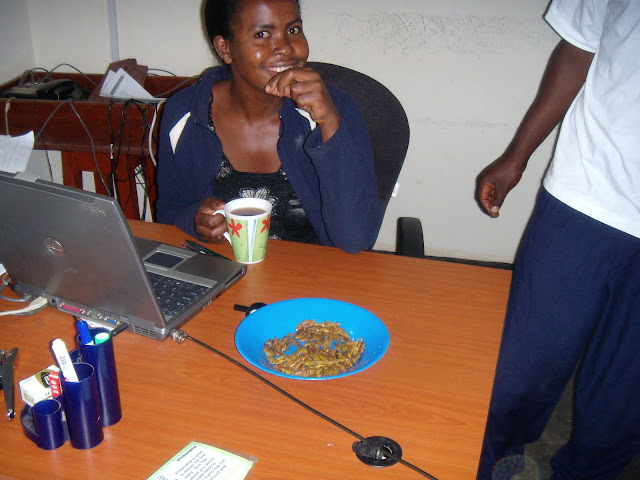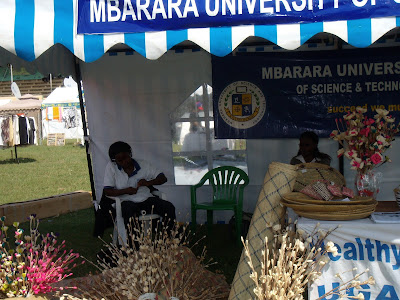A few weeks ago I was invited to attend the introduction and give away for Harriet, one of the girls who works in the VSO office in Kampala. The introduction and giveaway ceremony is part of a traditional Ugandan marriage ceremony. Traditionally, there used to be 3 events - the introduction, where the girl takes her husband-to-be home to meet her family; the giveaway, which is held at the home of the girl's parents, it involves her family officially 'giving her away' to the husband's family and then finally the wedding ceremony. These days it's quite common for the introduction and giveaway to be held together on the same day.
Traditionally the first two of the three ceremonies are paid for by the brides family and the wedding ceremony is paid for by the grooms family. This is after the 'bride price' has been agreed - the money that the groom's family pays to the bride's family as payment for her! The price is calculated in cows, even though most urban families wouldn't actually hand over cows these days, it's be the value of a certain number of cows - apparently fresian cows are far more valuable that the traditional ankole (big horned) cows. I was having a discussion about all this with Nasser recently, he's getting married soon, and we agreed that in effect the groom's family pay for everything - they pay the bride price which is used by the bride's family to pay for the introduction and giveaway ceremonies and then they also pay for the wedding ceremony!!
So in true Ugandan style the timing of the event did not quite go as plan - the invite said it'd start at 12.00p.m but I'd been told to get there for about 2.00, I arrived with two other VSOers at about 2.30. We were seated in a small room in the family house with 2 other non-Ugandan guests (the Ugandan guests ate outside somewhere apparently) and given vast amounts of traditional food for lunch.
The decoration of the home compound was spectacular, with numerous white tents for all the guests and there were many of them, each one decorated with swags of really colourful fabric (pink and green - two colours are chosen to represent each of the two ceremonies), there were arrangements of fresh roses everywhere, a huge cake on display and lots of young women walked around in brightly coloured lime green dresses - some of these were Harriet's sisters and friends. There were also 2 MC's, who kept everyone informed about what was going on, everyone except us as we couldn't understand a word.
The event finally began about 3.30 with the arrival of the groom's family, they were greeted by the girls in green who gave each one of them a green corsage to pin on their clothing. They then proceeded to walk to a tent that was reserved especially for them.
The day was marked by many traditional rituals, such as the groom's family having to 'guess' who the bride was from a line up of girls; the bride having to 'search' for her 'man'; the handing over of numerous gifts to different members of each family, many of them having traditional symbolic importance. It truly was fascinating, the female guests were dressed in wonderfully colourful outfits, there was lots of entertainment and very little alcohol consumed by anyone.
Waiting for the arrival of the groom and his family. There was also another set of about 8 girls in different costumes who took part in the actual ceremony.
One of the MC's in action - that's the groom's family's tent behind him
Traditional dancers provided entertainment throughout the day
Traditional dancer
Harriet searching for her 'man' amongst the guests in the groom's tent.
She was dressed in green for the introduction ceremony.
Having found and identified him, she gave him a different corsage and he came to sit at the front of the tent with Harriet, though she was only remained there for a short while. She spent most of the event sitting on a mat on the ground in front of her family's tent surrounded by her 'matrons'
Harriet, to the left, in the second of her two outfits, this one pink and turquoise was for the giveaway ceremony. The accompanying 'matrons' also changing costumes twice.
And finally, a picture of me with Harriet, after the gifts were presented. It was the only time I got to speak to and have a photo taken with her - it was only brief, as the MC kept telling her to hurry up!
It was a lovely day, probably hugely expensive as well, and I think a quite a posh 'do' as traditional ceremonies go.




















































